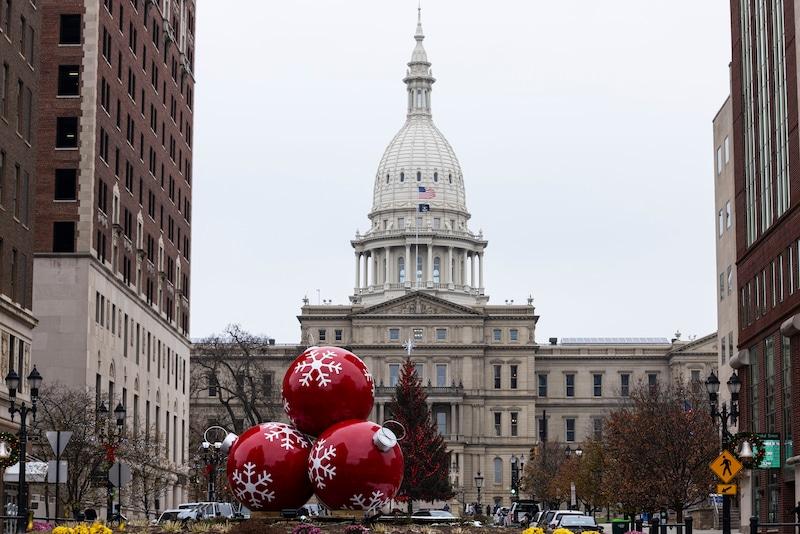
Environmental protections become a casualty of Michigan lame duck chaos, advocates say
LANSING, MI - As the smoke cleared on the chaotic final days of Michigan Democrats’ first governing trifecta in 40 years, environmentalists bemoaned the state legislature’s failure to expand Great Lakes water protections and hold polluters accountable.
A raft of environmental legislation sunk in the state House, where Republican boycotts and Democratic infighting prevented votes on dozens of bills before it adjourned on Thursday in the final days of the lame duck session.
“I see it as a huge missed opportunity,” said Charlotte Jameson, chief policy officer of the Michigan Environmental Council.
Democrats will lose control of the chamber in January, dimming advocates’ hopes of passing legislation they say is critical to safeguarding Michigan’s air and water as Donald Trump returns to the White House promising to roll back regulation.
Some environmental bills had passed the state Senate and had necessary support to make it to Gov. Gretchen Whitmer’s desk but never got a vote, Jameson said.
“So many strong, popular water protections were left dead in the water when the Michigan House gave up voting for the year. The most thoroughly negotiated statewide septic code: flushed. Frozen water protections: freezer burned. An affordable drinking water plan: swirled down the drain,” reads an Environmental Council statement on the week’s events.
The wrap-up singled out bills that would have restored state regulators’ ability to develop rules preventing chemical spillages and limiting pollution from farms and factories, legislation helping low-income residents afford water bills and measures ending Michigan’s status as the only state in the nation without a statewide septic code.
Bacterial and nutrient contamination from failing septic systems can drive harmful algae blooms and beach closures, sickening residents. Michigan has debated new state regulations for decades but failed to pass them.
“I think it’s just embarrassing,” Jameson said.
Environmental groups held many individuals responsible for the lame duck hiccups.
They included House Republicans who refused to show up for votes, the House Democratic leaders who failed to corral dissenting members whose absence prevented the quorum necessary to advance legislation and Democratic holdouts on bills like the water affordability package.
Some also took a broader view.
“I lay the blame at the feet of our corrupt money-in-politics system. The way that corporations drive the agenda in Lansing is just the biggest open secret out there,” said Christy McGillivray, legislative and political director for the Michigan Chapter of the Sierra Club.
Lawmakers' failure to protect Great Lakes water and Michiganders’ health will be reflected on legislative scorecards the Sierra Club publishes, she said.
A spokesperson for the House Democratic Caucus accepted a request for comment on Friday, but did not respond to environmentalists’ dissatisfaction.
In a statement issued last week, House Speaker Joe Tate, D-Detroit, placed blame on Republicans, their leadership and state Rep. Karen Whitsett, D-Detroit, who refused to attend session unless certain priorities were taken up.
In contrast to the House’s abrupt adjournment, the Senate pulled an all-night shift to advance legislation to Whitmer’s desk. That included Democratic priorities like expanding the state’s hate crime law, easing access to birth control and overhauling the Michigan State Police’s gun buyback program.
The Sierra Club noted the Senate had also unexpectedly moved bills restoring requirements that corporate polluters pay for the cost of cleaning up toxic contamination, though the legislation ultimately died in the House.
Other legislation before the Senate, like a bill establishing an incentive for e-bike purchases and measures to better prevent and treat lead poisoning, failed to advance.
Bills aiming to boost state park funding also died in the Senate, and efforts to increase hunting and fishing license fees stalled in the House.
A new set of state building codes updating energy efficiency standards for new homes, slashing carbon emissions and cutting utility bills, also languished during lame duck. A bipartisan committee led by Democrats failed to meet and take a vote required to advance them amid staunch pushback from residential homebuilders.
Michigan’s codes are now a decade old. Jameson said the updates can be refiled in the new year but face the prospect of further delays.
She noted the lack of activity in the state House in the late summer and fall. House leadership postponed action on legislative priorities until lame duck, she said, hoping to give lawmakers time in their districts ahead of the pivotal November elections.
“I think we got to the place we did in lame duck, where there was this backlog of bills that we really needed to see action on, and we were scrambling, and legislators were scrambling to try and move things through in this narrow window, because we hadn’t done anything for the majority of the year,” Jameson said.
Still some bills, like the water affordability and polluter pay packages, had “years of work” behind them and were well-vetted when they got to lame duck, said McGillivray.
Tax breaks for large water- and power-hungry data centers undergirding artificial intelligence technology did emerge from the lame duck chaos, despite warnings from environmental groups they could burden utility ratepayers and lead power companies to take off-ramps from state clean energy goals, according to McGillivray.
“The one thing they got through was something the industry desperately wanted,” Jameson said.
She could only think of one significant pro-environmental bill Whitmer signed in 2024, preventing homeowners’ associations from blocking energy efficiency elements in their neighborhoods, like rooftop solar panels.
Not all environmental priorities are necessarily doomed under a divided Legislature in the new year. McGillivray said the water affordability legislation did have some bipartisan support.
Other bills supported by industry, like a package dealing with carbon capture and deep-underground storage, will likely require votes from both sides of the aisle, giving environmental advocates and opportunity to address their concerns over the legislation, said Jameson.
But she’s also tempering expectations.
“I really think that there’s just going to be a lot of nothing happening in the next two years, at least on our issues,” Jameson said.


Comments1
Why the preferred pejorative for these Nazis is the other N-WORD
Why the preferred pejorative for these Nazis is the other N-WORD Environmental protections become a casualty of Michigan lame duck chaos, advocates say